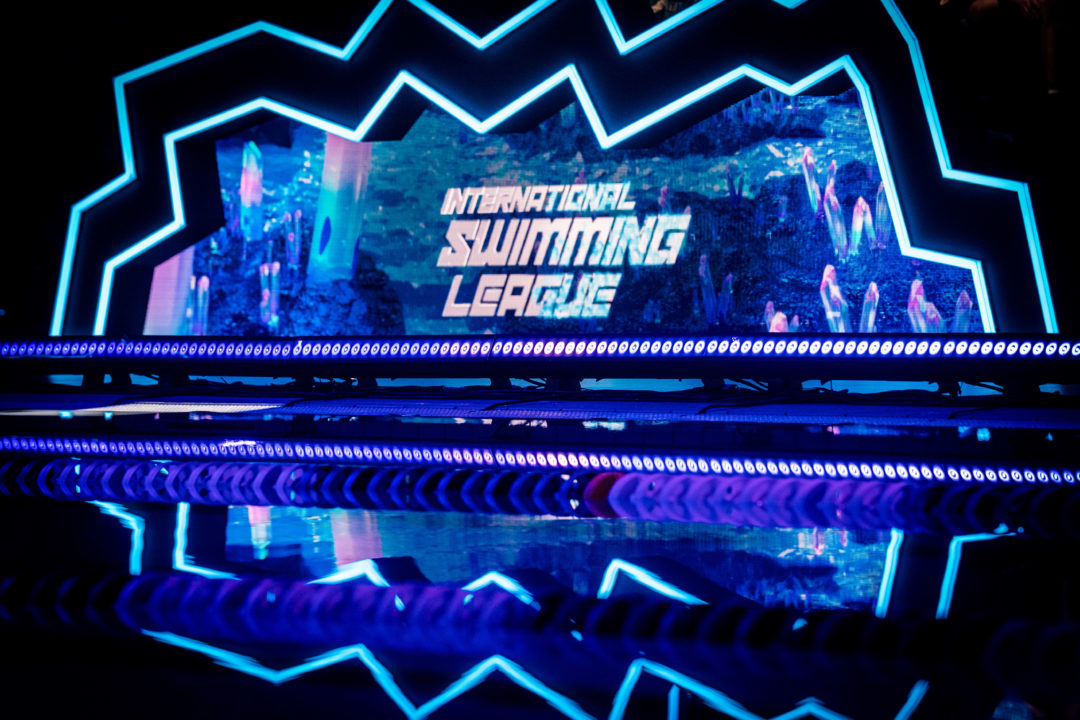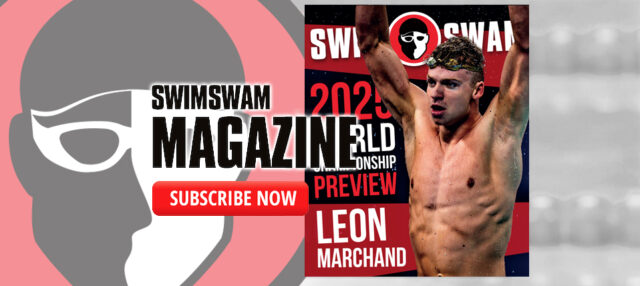The third season of the International Swimming League kicks off on August 26, marking the latest iteration of the evolving endeavor. Ahead of the new season, SwimSwam’s Mel Stewart caught up with ISL founder Konstantin Grigorishin to reflect on what the league has done so far, and where it’s going.
More of Grigorishin’s thoughts on the future of ISL are available in the Fall 2021 print issue of SwimSwam Magazine. Subscribe here.
Profitability
One of the biggest questions looming over the ISL since its inception is how it will make money — outside of Grigorishin’s own contributions. Grigorishin said that if not for the pandemic’s impact on season two, season three would have been the target to at least generate enough revenue to cover costs, if not become profitable.
“Financially and commercially, it has not been easy for the ISL at all. I’m not going to deny that,” Grigorishin said.
He added that the league is continuing to develop its “gamification environment,” including the booming areas of betting and fantasy league.
“Nevertheless, our initial financial targets have had to be adjusted. I’m not going to put myself into a box by saying that the ISL must move into profit by this much and by this specific date. What I will say is that the events in the pool have proven we have a good product. Both the swimmers and the fans really like the ISL, and this stability and success is creating new options for investment, some of which I expect to come to fruition in the next 12 months as we move from Season 3 to Season 4 in 2022.”
Relatedly, Grigorishn said there is growing interest from potential sponsors, an area in which the league currently lags.
“Many potential partners were waiting to see how the ISL would develop, but following the successes of 2019 and 2020, there is now considerable, growing interest on the behalf of potential sponsors, as TV and digital audiences for the first two seasons were very encouraging for a ‘startup’ sports entity like the ISL,” he said. “However, it’s a little too early to say what this could amount to in terms of firm commitments or revenue.”
Competing Organizations
It’s no secret that the ISL, at least when it began, positioned itself in direct opposition to established organizations, like FINA, and established competitions, like the Olympics. FINA, for its part, launched a copycat competition — the Champions Series — shortly after the ISL was announced.
But three years later, both the ISL and FINA say that they can coexist and mimic the format seen in other professionalized individual sports, like track and field.
“In our relatively short time as a professional league, we have been focused on putting the power back into the hands of the athletes, championing the right of professional swimmers to make the living they deserve and having a greater say in the way their sport is run,” Grigorishin said. “However, we can work together with FINA for the benefit of everybody, and there doesn’t have to be a conflict. I’ve used the comparison before between the ISL and athletics’ Diamond League, and this is a good analogy in this instance as well. The Diamond League is an independent commercial entity, but there is no major conflict with World Athletics concerning the calendar and the World Athletics Championships or Olympics.”
Grigorishin took a similar approach when it comes to the ISL’s relationship with the upcoming Australian Swimming League, a new national professional league. He likened the potential relationship to the international soccer system, wherein top players can compete in multiple leagues for multiple teams throughout the year, with one top league.
“ISL is pleased and gratified to inspire the creation of such national leagues,” Grigorishin said. “The creation of the ASL reinforces our own vision of the future of swimming, and we wish the ASL well, as I believe it can only be complementary to the ISL.After all, the existence of an attractive Premier League, La Liga or Serie A in soccer enhances and complements the Champions League. This is the way I would envisage we can function together in the future.”
Prize money:
In season two, eight swimmers earned $100,000 or more in prize money, with Caeleb Dressel maxing out at over $291,000 with $165,000 coming from his MVP bonus alone. But the vast majority of the league earned $60,000 or less, with a handful taking home nothing at all, begging the question of if there’s too big of a disparity in prize money and how it’s allocated.
Grigorishin says an enthusiastic ‘No.’
“We need to have prize money incentives in place for the teams to perform, so the disparity is unavoidable. It is that simple. You will find the same disparity in almost any professional sport, including individual sports such as athletics and cycling. Look at the domestic bonuses most soccer leagues in Europe pay out to clubs: they are allocated according to ranking,” he said. “None of our research, nor our discussions with the teams and individual swimmers, suggest that we should significantly change the incentive structure, let alone that it could be, as you put it, an existential threat.”
The bigger issue isn’t prize money between athletes, though. The bigger issue is the prize money disparity between teams, and the way prize money is structured to dramatically encourage the top athletes to the top teams – making any semblance of parity a challenge.
Last season, the victorious Cali Condors earned a total of $1,457,800 in prize money. The last place Aqua Centurions earned a total of $158,600 in prize money.
Doping:
One of the league’s most radical policies is its hardline stance banning any swimmer who has ever been suspended for violating anti-doping policies, regardless of what they do or if the suspension is later overturned. That includes swimmers like Ryan Lochte, who was suspended 14 months for taking (legal) vitamins through an IV, and Madisyn Cox, who was cleared of wrongdoing when she was able to prove she unknowingly took a contaminated supplement.
As the league could benefit from some added starpower like Lochte’s, many have wondered if the stance could ever loosen,
“Our stance on doping is vital to the league’s integrity. We will not waver on this, and I see our policy as a major asset to the ISL – NOT a hinderance,” Grigorishin said. ” The feedback from swimmers competing in the ISL is that they take the same view and the vast majority have welcomed our ‘hard stance.'”


Really speaking, how long can the swimmers who take home almost nothing continue to pursue this? It would be good to do an economic analysis of this to make sure our beloved swimmers can make a living. Not everyone gets endorsements or sponsorships.
I do like that he’s very unequivocal!
The only issue I see with significantly more bonus money going to the best teams is that you’re just gonna get all of the best athletes on those teams and this’ll all get even more uncompetitive, the thing they say they really want. (I could be way off on this, but it seems like swimmers can sorta change teams pretty easily? I could not follow basically any of the rules this offseason, so maybe swimmers are more locked in than I realized.)
Does the ISL do any drug testing themselves? I feel like I remember seeing they just go off what other bodies find, which might also be a bit of… Read more »
I mean, it’s the NBA superteam model, right? We’re an ISL season away from “Dressel’s team and his supporting cast” or “Dressel’s going to take his talents to South Beach.” Has worked for the NBA and its star players, so I guess, why not? They need to drug test Boxall if he ever coaches with them.
At the moment, there’s no incentive for Dressel to ever leave Cali Condors.
They’ll have to fix that.
Because at least with the NBA, the superteam shifts. Sometimes they’re here, sometimes they’re there.
There may be no incentive, but it’d be easy enough for him to do. He just has to make it an issue. He’s going to be the big draw — by far — so all he has to do is move. He’s not under a lifetime contract. He can say he’ll sit out a season if he doesn’t get his way.
Do you get the impression that this is how Caeleb operates? I don’t.
meanwhile I am just lurking around to see if some world records break
For me personally the ‘gamification’ of the ISL has gone a little too far. When you’re watching the races it can be kind of confusing. Take this year’s draft… I tuned out because the waves of “protection” etc. We’re too much to keep track of.
His comments about the disparity also don’t sit well with me. What incentive/funding do I have to keep training if Dressel keeps stealing all my points and therefore money?
Agree. There should be a cap on how much money one swimmer can make. Once that amount is reached, the rest of what that swimmer earned should be split amongst the swimmers of that team.
Damn, wait til another billionnaire funds a swimming league with doping, blackjack and hookers
ISL season 2 swimmer here. Wishing you guys touched on the fact that we haven’t received all our payments from Season 2 yet. Not a big superstar so Im sure the top swimmers have, however, still pretty devastating and leaves a bad view on the franchise.
Thank you for you testimony, athletes should stand more often like you do about this issue. one of the main objective of this league is to give additionnal revenue to pro swimmers. If it is not done correctly, I don’t see the point on continuing to participate to this league.